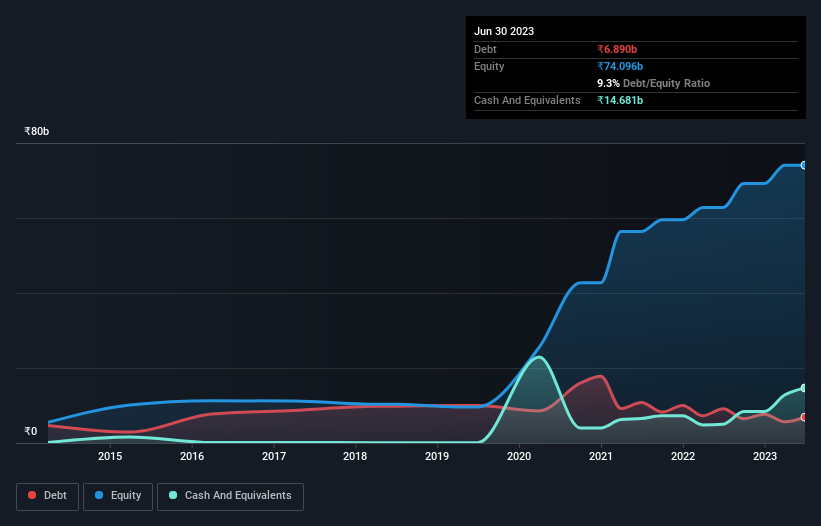- India
- /
- Healthcare Services
- /
- NSEI:MAXHEALTH
Max Healthcare Institute (NSE:MAXHEALTH) Could Easily Take On More Debt

Legendary fund manager Li Lu (who Charlie Munger backed) once said, 'The biggest investment risk is not the volatility of prices, but whether you will suffer a permanent loss of capital.' So it might be obvious that you need to consider debt, when you think about how risky any given stock is, because too much debt can sink a company. Importantly, Max Healthcare Institute Limited (NSE:MAXHEALTH) does carry debt. But the more important question is: how much risk is that debt creating?
When Is Debt Dangerous?
Debt and other liabilities become risky for a business when it cannot easily fulfill those obligations, either with free cash flow or by raising capital at an attractive price. In the worst case scenario, a company can go bankrupt if it cannot pay its creditors. However, a more usual (but still expensive) situation is where a company must dilute shareholders at a cheap share price simply to get debt under control. Of course, debt can be an important tool in businesses, particularly capital heavy businesses. When we examine debt levels, we first consider both cash and debt levels, together.
View our latest analysis for Max Healthcare Institute
What Is Max Healthcare Institute's Net Debt?
You can click the graphic below for the historical numbers, but it shows that Max Healthcare Institute had ₹6.89b of debt in March 2023, down from ₹9.13b, one year before. However, it does have ₹14.7b in cash offsetting this, leading to net cash of ₹7.79b.

A Look At Max Healthcare Institute's Liabilities
Zooming in on the latest balance sheet data, we can see that Max Healthcare Institute had liabilities of ₹10.5b due within 12 months and liabilities of ₹16.5b due beyond that. Offsetting this, it had ₹14.7b in cash and ₹3.67b in receivables that were due within 12 months. So its liabilities outweigh the sum of its cash and (near-term) receivables by ₹8.58b.
This state of affairs indicates that Max Healthcare Institute's balance sheet looks quite solid, as its total liabilities are just about equal to its liquid assets. So while it's hard to imagine that the ₹559.0b company is struggling for cash, we still think it's worth monitoring its balance sheet. While it does have liabilities worth noting, Max Healthcare Institute also has more cash than debt, so we're pretty confident it can manage its debt safely.
In addition to that, we're happy to report that Max Healthcare Institute has boosted its EBIT by 47%, thus reducing the spectre of future debt repayments. There's no doubt that we learn most about debt from the balance sheet. But it is future earnings, more than anything, that will determine Max Healthcare Institute's ability to maintain a healthy balance sheet going forward. So if you're focused on the future you can check out this free report showing analyst profit forecasts.
Finally, while the tax-man may adore accounting profits, lenders only accept cold hard cash. While Max Healthcare Institute has net cash on its balance sheet, it's still worth taking a look at its ability to convert earnings before interest and tax (EBIT) to free cash flow, to help us understand how quickly it is building (or eroding) that cash balance. Over the most recent three years, Max Healthcare Institute recorded free cash flow worth 54% of its EBIT, which is around normal, given free cash flow excludes interest and tax. This cold hard cash means it can reduce its debt when it wants to.
Summing Up
While it is always sensible to look at a company's total liabilities, it is very reassuring that Max Healthcare Institute has ₹7.79b in net cash. And it impressed us with its EBIT growth of 47% over the last year. So is Max Healthcare Institute's debt a risk? It doesn't seem so to us. Above most other metrics, we think its important to track how fast earnings per share is growing, if at all. If you've also come to that realization, you're in luck, because today you can view this interactive graph of Max Healthcare Institute's earnings per share history for free.
At the end of the day, it's often better to focus on companies that are free from net debt. You can access our special list of such companies (all with a track record of profit growth). It's free.
New: Manage All Your Stock Portfolios in One Place
We've created the ultimate portfolio companion for stock investors, and it's free.
• Connect an unlimited number of Portfolios and see your total in one currency
• Be alerted to new Warning Signs or Risks via email or mobile
• Track the Fair Value of your stocks
Have feedback on this article? Concerned about the content? Get in touch with us directly. Alternatively, email editorial-team (at) simplywallst.com.
This article by Simply Wall St is general in nature. We provide commentary based on historical data and analyst forecasts only using an unbiased methodology and our articles are not intended to be financial advice. It does not constitute a recommendation to buy or sell any stock, and does not take account of your objectives, or your financial situation. We aim to bring you long-term focused analysis driven by fundamental data. Note that our analysis may not factor in the latest price-sensitive company announcements or qualitative material. Simply Wall St has no position in any stocks mentioned.
About NSEI:MAXHEALTH
Max Healthcare Institute
Provides medical and healthcare services in India.
High growth potential with excellent balance sheet.


